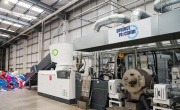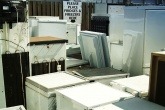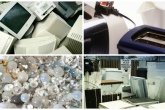UK misses WEEE collection targets for third year running
The Environment Agency (EA) has published its annual household waste electrical and electronic equipment (WEEE) collection figures, revealing that the UK has fallen short of its WEEE collection targets for the third consecutive year.

From January to December 2019, 494,976 tonnes of household WEEE were collected, 55,156 tonnes below the overall UK collection target of 550,132 tonnes.
Falling short of its target for Large Household Appliances, the UK collected 174,186 tonnes against a target of 185,585 tonnes. The shortfall for Small Household Appliances was even greater, with the UK collecting only 65 per cent (35,537 tonnes) of its 54,756-tonne target.
WEEE collection targets are based on the amount of electrical and electronic equipment (EEE) placed on the market over the previous three years – it is now required under the EU WEEE Directive and UK WEEE Regulations 2013 that 65 per cent of the weight of EEE placed on the market (POM) or 85 per cent of WEEE generated (WG) in the preceding three years should be collected each year.
With the EA’s figures throughout 2019 consistently suggesting that the UK was on course to miss its targets, the government has taken steps to boost WEEE collection rates by improving the convenience of recycling – at the start of this year, the Department for Environment, Food and Rural Affairs (Defra) announced that the fifth phase of its WEEE Distributor Takeback Scheme (DTS) will require larger retailers to provide in-store take-back facilities from January 2021 rather than paying a fee to cover recycling obligations under the DTS.
Producer compliance schemes (PCS) that did not meet their targets will be required to pay the compliance fee, which will be determined in a few months time using methodology put forward by the Joint Trade Association (JTA). The compliance fee is a mechanism by which producers are able to fulfil their recycling obligations despite not acquiring sufficient recycling evidence during the year.
Increasing targets doesn’t mean more collections
Commenting on the new figures, Louise Grantham, Chief Executive at REPIC, said: “As we anticipated, the overall household WEEE collections in 2019 have remained broadly static relative to 2018, with a slight increase of roughly 1,600 tonnes overall. EEE placed on the market has increased relative to 2018, however, the move to open scope and stocking levels around Brexit are thought to explain most of this.
“The amount of WEEE arising was below target in every category. Our own research shows the relationship between EEE POM and WEEE collected is complex, and increasing the PCS targets does not lead to more WEEE being made available for collection. The WEEE and EEE Flows Study commissioned by the WEEE Fund will provide more information on opportunities to either increase collections or identify legitimate alternative end of life product flows.
“There is certainly an opportunity to increase awareness amongst householders to encourage them to dispose of unwanted electricals in a timely fashion, and in the correct way. Our own most recent consumer survey indicates there are high numbers of unused products within households and we will be releasing this data in the next few months.
"We welcome the launch of the new ‘Recycle Your Electricals’ campaign later in the month and the review of the WEEE Regulations this year. We look forward to working with Defra and other WEEE stakeholders to consider future target setting and ways in which we can continue to improve the UK system.”
‘No one surprised’ by results
The missed targets are not viewed as a surprise by much of the industry, given the very high
Robbie Staniforth, Head of Policy at Ecosurety, commented: “I think it was Einstein who said the definition of insanity is doing the same thing over and expecting a different result. The government again set a challenging target and again it was missed, showing that amount of WEEE recycled is now decoupled from targets. No one in industry will be surprised by these results.
“The compliance fee, producer balancing system, target-setting and WEEE fund are all necessary evils, rather than a well thought out policy framework. It is heartening to see the policy wheels starting to turn in government as only a change in legislation will restore sanity to this industry. We’re hopeful that it will be third time lucky for the WEEE system as we can learn from the mistakes of the previous two versions of the regulations.”
Nigel Harvey, CEO of Recolight, added: “The government's WEEE collection targets have now been missed three years in succession. In part, that is because Defra adopted a new gold standard target in 2019, based on 65 per cent of previous years' EEE sales. That target is proving challenging for virtually every EU country, and so it is not surprising that the UK has also struggled.
“Some positive steps have been announced in recent months that should improve collections: requiring retailers to collect WEEE instore, and the imminent launch of a major consumer awareness campaign, financed by producers.
“But with 2020 targets about to be the subject of a short consultation, it is to be hoped that this year's targets will still be stretching and challenging, but also within the range of achievability.”







